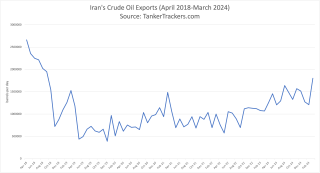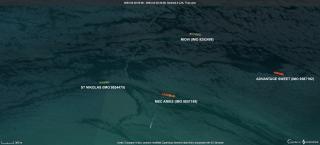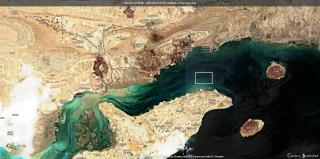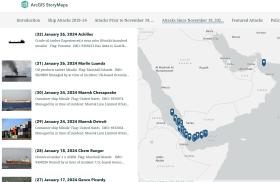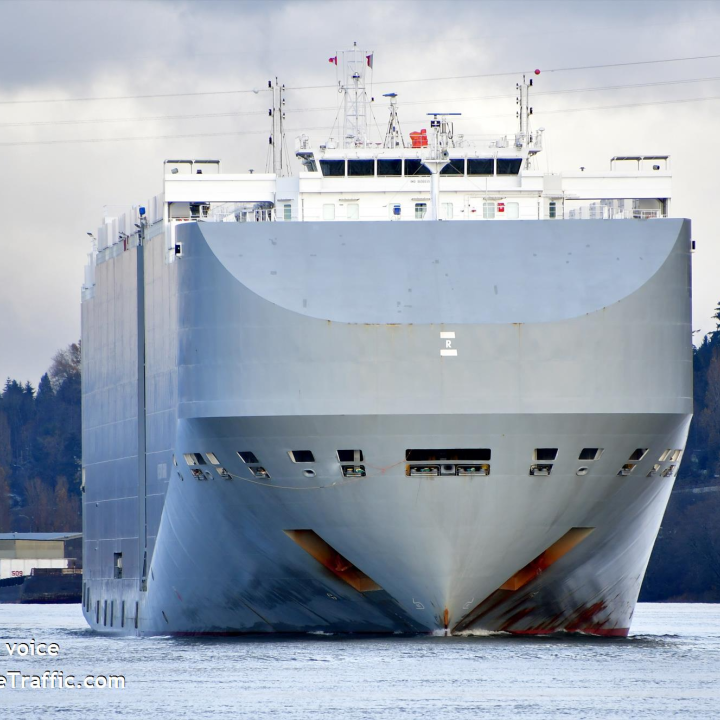
Pay Attention to Ship Seizures, Not Threats to Close Strait of Hormuz

Part of a series: Maritime Spotlight
or see Part 1: Tracking Maritime Attacks in the Middle East Since 2019
Low-key actions like seizures can increase regional and global concerns and increase Iran's leverage.
This post was authored in collaboration with TankerTrackers.com. Photo credit for main web image: Rick Voice via MarineTraffic.com.
Warnings from Iranian officials about shutting down the Strait of Hormuz always make headlines, effectively paralyzing the energy and shipping markets with anticipation. But Iran has brandished this threat for decades and never followed through on it, mostly because Tehran itself relies on the strait for oil export and sea commerce, and its million-barrel-per-day (bpd) crude oil export terminal just outside the strait is not yet fully operational.
An average of some 20 million bpd of crude oil, condensates, and oil products passed through the world’s most vital chokepoint in 2023. In March 2024, Tehran’s crude oil exports were close to 2 million bpd, according to TankerTrackers.com. Meanwhile, China, the world’s largest crude oil importer, and Iran’s main client, wants a stable Persian Gulf in order to maintain an uninterrupted flow of oil. Last month, China’s total crude and condensate imports stood at around 11.2 million bpd, with much of it (about 5 million bpd, according to data from Kpler) originating from the Persian Gulf.
Tehran has another way to disrupt maritime traffic and global trade that does not harm its own interests: by seizing commercial ships related to rival countries, such as Israel and the United States, in response to acts it considers provocative. Such low-key actions can increase regional and global concerns and give Iran greater leverage.
Prior to April 2024, Iran’s overt actions mainly affected vessels believed to be linked to U.S. sanctions affecting Tehran’s oil industry. Yet the picture changed on April 13—the same day as Iran’s missile strike against Israel—when Iran’s Islamic Revolutionary Guard Corps Navy (IRGCN) seized the container ship MSC Aries in a helicopter raid northeast of Fujairah, near the Strait of Hormuz. While the MSC Aries is Portugal-flagged and operated by Switzerland-based company MSC, it is chartered from Gortal Shipping, a company affiliated with the Israeli shipping magnate Eyal Ofer’s Zodiac Maritime. It was the first time Iran had seized a ship connected to Israel.
The satellite images below, created in collaboration with TankerTrackers.com, show the locations of the four vessels currently detained in Iranian waters: the container ship MSC Aries (IMO 9857169); crude oil tanker St. Nikolas (formerly Suez Rajan, IMO 9524475), seized in January 2024; crude oil tanker Niovi (IMO 9292498), seized in May 2023; and crude oil tanker Advantage Sweet (IMO 9587192), seized in April 2023. (Further details on the associated attacks are available in the interactive map.)
The MSC Aries may have been Iran’s first direct seizure of an Israeli-linked vessel, but additional attacks on Israel-linked shipping have occurred in recent years in the Arabian Sea, Indian Ocean, and Gulf of Oman, with the blame placed on Iran. These ships have been linked to Zodiac Maritime, Eastern Pacific Shipping (run by Idan Ofer), and Ray Shipping—which owns the Galaxy Leader, the car carrier hijacked by the Houthis in November 2023. Weapons used have included one-way attack drones (OWADs), limpet mines and probably rocket-propelled projectiles. For instance, on December 23, 2023, the Liberia-flagged oil/chemical tanker Chem Pluto (IMO 9624770) was attacked by an OWAD in the Indian Ocean. The United States blamed Iran. At the time of the incident, the tanker was managed by Netherlands-based Ace Quantum Chemical Tankers, a joint venture of Ace Tankers and the earlier-noted Eastern Pacific Shipping.
Over the period 2019-22, the Iran-Israel maritime shadow war damaged at least thirteen ships, and killed at least two mariners.
In light of the MSC Aries seizure, vessels with links to Israel-born shipowners will now face greater risks, and particularly if Iran-Israel hostilities remain high, or if Israeli forces invade the last Hamas stronghold of Rafah, in Gaza. Strikes on such vessels around the Persian Gulf could be part of an evolving Iranian strategy to act against Israel beyond the Red Sea and Bab al-Mandab Strait, while also testing the Israeli and Western reaction. On the day the MSC Aries was seized, at least one other container ship with links to Zodiac Maritime was in the area, but this vessel successfully departed the Persian Gulf and sailed to Asia, while keeping its AIS off as it transited the Strait of Hormuz.
Based on the available data, if Israel refrains from establishing and enforcing red lines in the sea, Iran will likely continue seizing or attacking Israel-linked ships as far away as the Indian Ocean to a point that could make sea commerce throughout the region for Israel untenable. Iran will also likely try to seize U.S.-linked ships if Congress presses the Biden administration for further oil-related sanctions. Unlike any threat to close the Strait of Hormuz, Iran still assesses these actions to carry a low risk.


